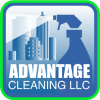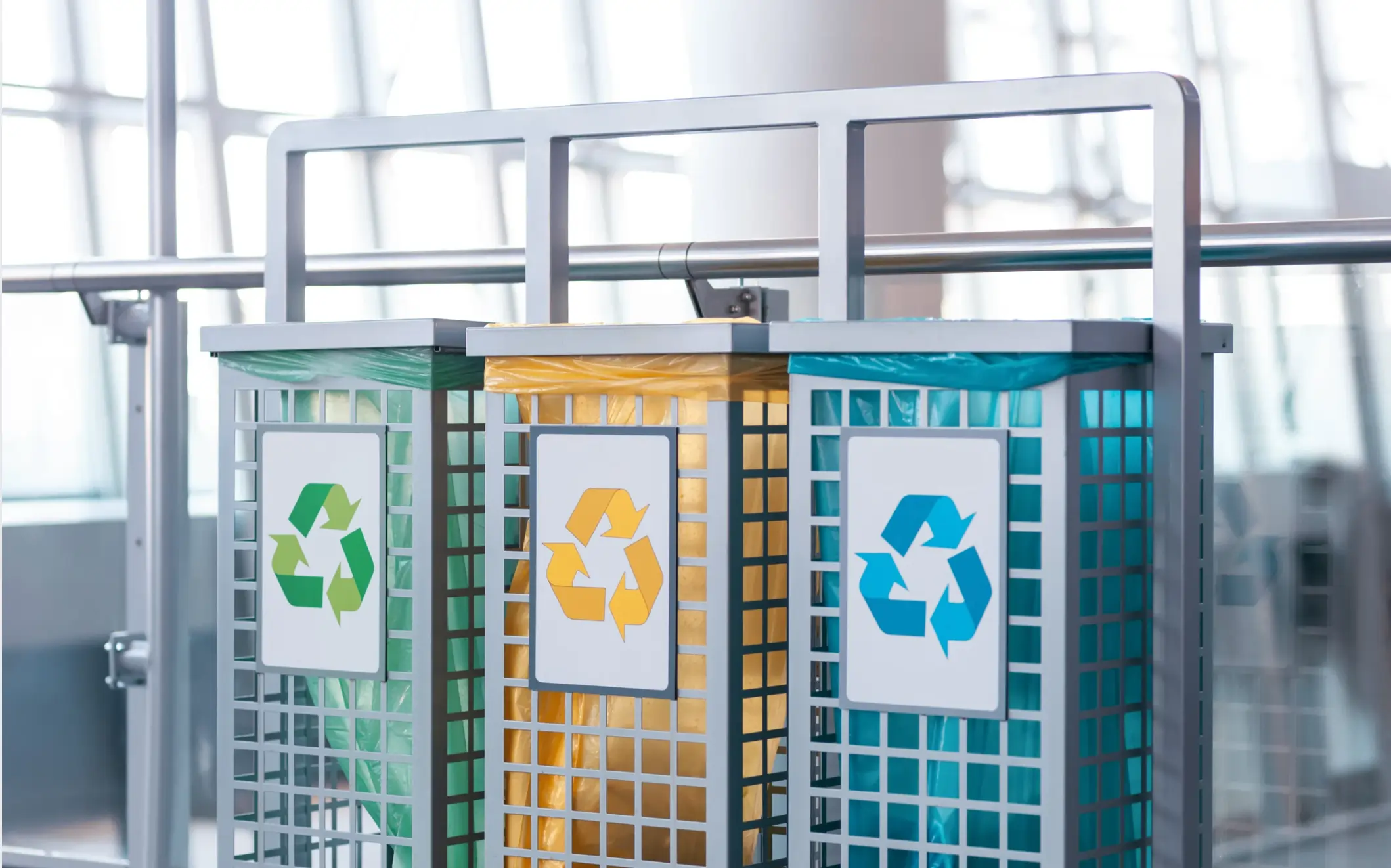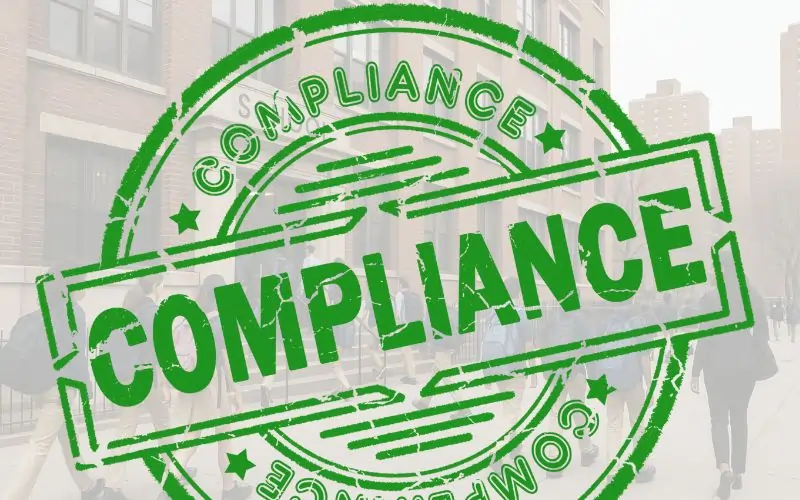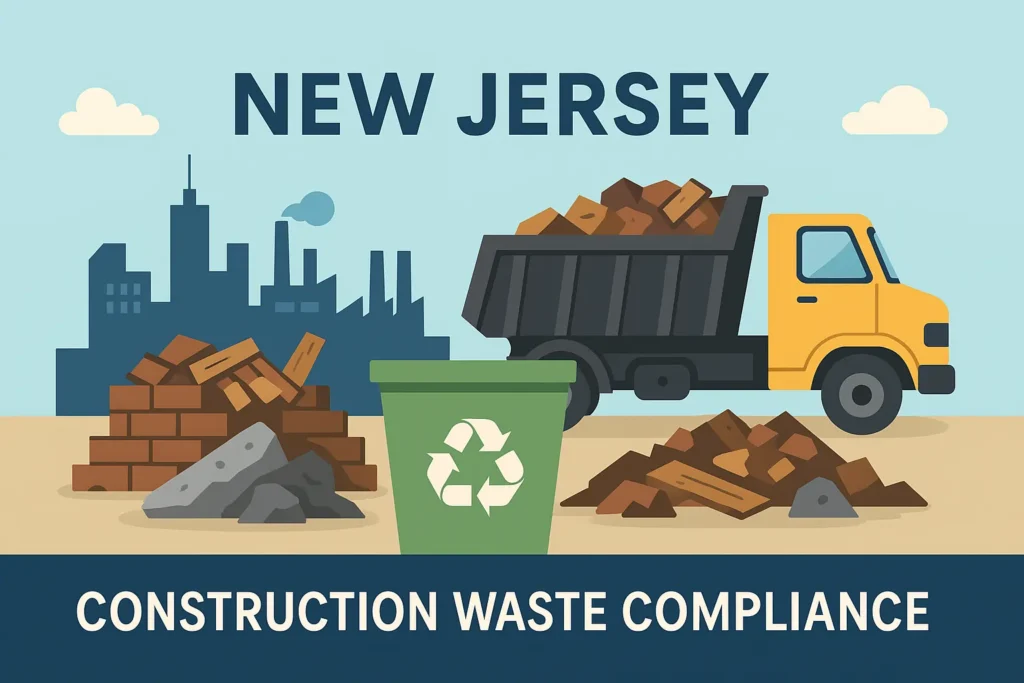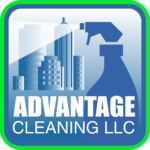In New York City, commercial office buildings face strict Department of Sanitation (DSNY) and Business Integrity Commission (BIC) regulations that govern waste disposal, recycling, and sidewalk cleanliness.
The NYC Sanitation & Disposal Rules applies to all commercial buildings AND residential buildings or mixed-use spaces. The rules mentioned in this article have been specifically selected as applicable for office buildings and commercial tenants, in order to easily find applicable regulations for office and facility managers in NYC.
As part of Mayor Eric Adams’ citywide push to modernize waste management and eliminate sidewalk garbage piles, New York City now mandates that all commercial properties—including office buildings—store waste in rigid, lidded containers, expand recycling compliance, and prepare for borough-wide containerization enforcement under DSNY’s Clean Curbs initiative.
Advantage Cleaning has over a decade of experience managing DSNY compliance across Class A, multi-tenant, and union office buildings in all five boroughs of New York City. Our NYC office cleaning services are built around city code, not generic janitorial checklists—so your property passes inspection, avoids fines, and meets lease-level obligations.
1. Sidewalk and Gutter Cleaning – Commercial Enforcement Only
Applies to: All NYC office buildings, regardless of size or tenant mix.
Regulation: NYC Administrative Code §16-118
Office property owners and managers are legally required to:
- Maintain the full sidewalk frontage of the building—including 18 inches into the street from the curb line.
- Clean daily, regardless of whether a third-party cleaning vendor is retained.
- Use only proper trash containers for debris—DSNY public litter baskets may not be used.
Commercial Enforcement Routing:
Unlike residential enforcement, which is time-limited, DSNY agents can issue citations to commercial properties at any time. However, most inspections focus on morning and evening windows, which vary by sanitation district. Office buildings should clean before opening and again after closing.
Penalties: $100–$300 per violation.
2. Trash Setout & Receptacle Requirements for Office Properties
Applies to: All commercial office buildings and office tenants.
Regulation: §16-120(a), (c)
Receptacle Standards:
- All trash must be stored in leak-proof containers with tight-fitting lids.
- Plastic bags must be black or opaque—clear, blue, or red bags are prohibited for general office waste.
- Recyclables must be placed in clearly labeled bins, per DSNY commercial recycling rules (see section 5).
Setout Timing (Strictly for Commercial Pickup):
- Trash may be set out no more than 1 hour before building closure if collection occurs post-hours.
- If pickup is scheduled during business hours, waste must be placed curbside no more than 2 hours prior to pickup.
- Never place office waste out on weekends or holidays. DSNY enforces violations even if carters are delayed.
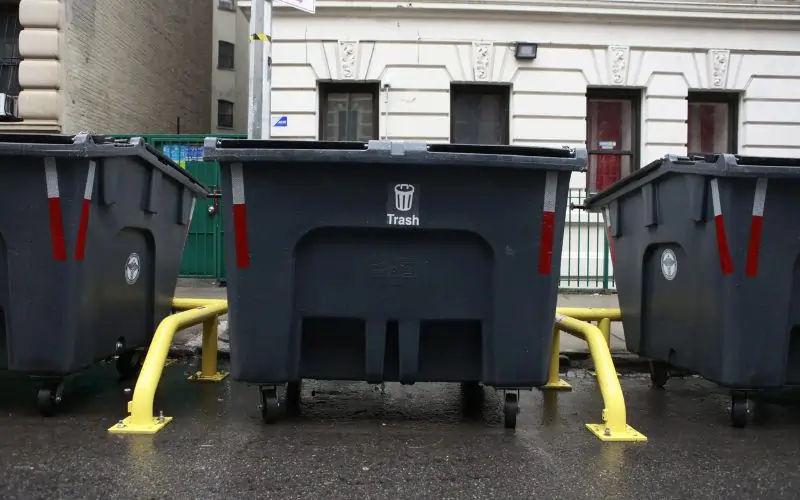
3. Private Carter Contracts—Mandatory for Office Buildings
Applies to: All NYC office buildings and any office-based business generating commercial waste.
Regulations: §16-116(b), §16-505(b)
Offices are not eligible for DSNY pickup. They must:
- Hire a licensed private carter for solid waste and recycling, or
- Register as a self-hauler through the NYC Business Integrity Commission (BIC).
Posting Requirement:
- A Carter Decal must be prominently displayed at the property.
- The decal must include the carter’s business name and days/times of pickup.
Exceptions:
None. Even single-floor offices in mixed-use buildings are required to follow this rule.
Fines:
- $100 for failure to post a decal
- Up to $10,000 for using an unlicensed hauler or for unregistered self-hauling.
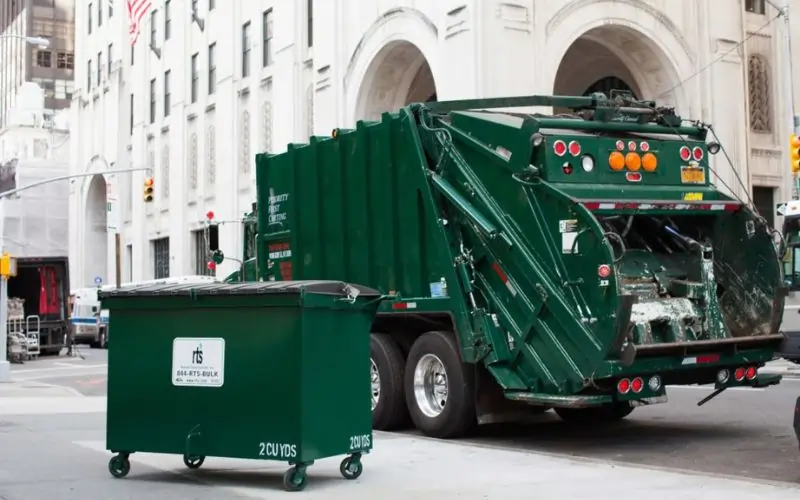
4. Public Litter Baskets: Not for Office Waste
Applies to: All office properties and commercial tenants.
Regulation: §16-120(e)
It is illegal for office staff, janitorial crews, or property maintenance teams to dispose of building waste in public DSNY litter baskets. These are pedestrian-only.
Penalties:
- $100 for the first offense
- Up to $300 for repeat offenses
- Content inspections are routine; identifying information (e.g., mail labels) is enough for citation.
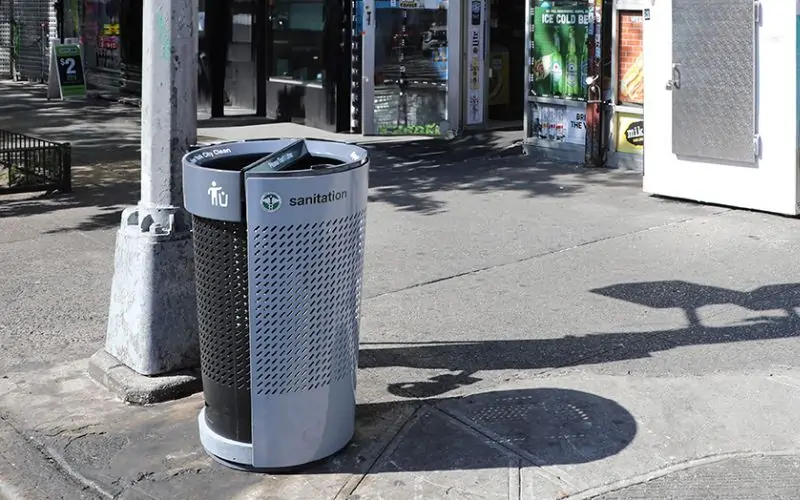
5. Commercial Recycling: Mandatory Separation of Office Waste Streams
Applies to: All office buildings and office-based businesses.
Regulation: §16-118.7(c)
Office facilities are required to separate and recycle:
- Paper, magazines, cardboard
- Rigid plastics, glass, and metals
- Beverage cartons and foil products
Notes for Office Managers:
- Bins must be clearly labeled and compliant with your private carter’s specs.
- Recycling must not be mixed with general trash under any condition.
- Non-compliance leads to commercial recycling violations, not residential citations.
Penalties: Up to $10,000 per violation.
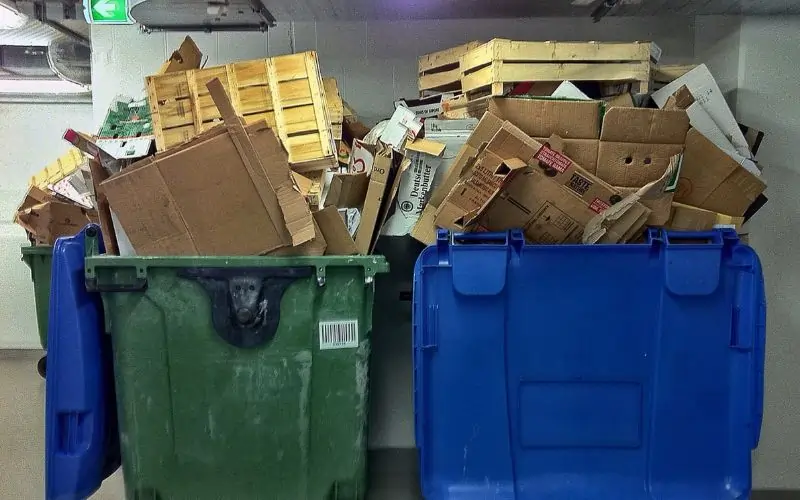
6. Dumpster Use and Street Container Rules
Applies to: Office buildings using containers for private carter pickup.
Regulation: §16-120(c)
If a dumpster is used for collection:
- It must remain covered at all times.
- After collection, it must be removed within one hour.
- Containers may not remain curbside overnight or be left unsecured.
Exceptions:
None. Applies even to office buildings with after-hours janitorial service.
7. Illegal Dumping: Office Waste Must Stay on Property
Applies to: All office buildings, office tenants, and janitorial contractors.
Regulation: §16-119, §16-120(a)
It is a violation to:
- Place office waste at a neighboring property or corner receptacle.
- Use another building’s private carter pickup zone.
- Dispose of regulated waste (e.g., batteries, electronics, appliances) in unauthorized ways.
Fines range from $100 to $20,000 depending on type of waste and intent.
8. Graffiti & Postings on Commercial Office Properties
Applies to: Owners and managers of commercial office buildings.
Regulation: §10-119, §10-121
- Building facades must be kept free of graffiti. Failure to remove graffiti can trigger a Notice of Violation.
- Attaching signage, flyers, decals, or posters to public infrastructure (trees, poles, benches) is prohibited—even for internal tenant events.
Fines:
$75–$550 per occurrence, plus removal costs.
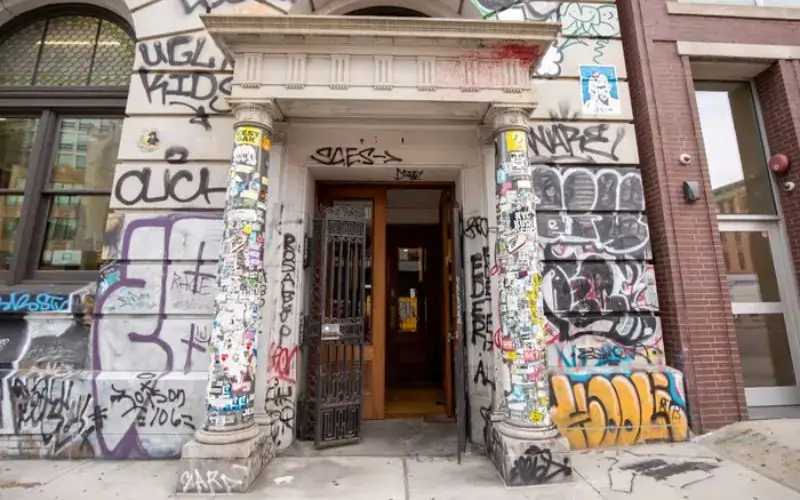
9. Handling Regulated or Hazardous Office Waste
Applies to: Office buildings, tenant firms, and their contractors.
Examples: Electronics, fluorescent bulbs, batteries, Freon appliances
Office buildings must not place the following in municipal waste streams:
- e-Waste (computers, phones, printers)
- CFL or tube lighting (mercury content)
- Air conditioners or refrigerators (Freon)
- Rechargeable batteries (must be returned to retailer or disposal vendor)
Violations of hazardous waste disposal laws can result in fines of $1,000 to $50,000/day.
Enforcement Snapshot – Office Facilities Only
| Violation | Regulation | Fine |
|---|---|---|
| Dirty sidewalk or 18″ zone | §16-118 | $100–$300 |
| No carter decal posted | §16-116(b) | $100 |
| Public basket misuse | §16-120(e) | $100–$300 |
| Improper or missing recycling bins | §16-118.7 | Up to $10,000 |
| Dumpster left on curb | §16-120(c) | $100–$200 |
| Unauthorized waste disposal | §16-120(a), §16-119 | Up to $20,000 |

A higher grade of Quality in Office Cleaning
How Advantage Cleaning Keeps Office Buildings Code-Compliant
Advantage Cleaning designs janitorial programs around New York City’s commercial sanitation laws—not generic service menus. Our compliance-driven services include:
- Curbline cleaning at DSNY enforcement times
- Trash and recycling setout scheduled to your private carter’s service window
- Labeling, separation, and inspection-readiness for all waste containers
- Receptacle management that meets DSNY requirements
- Real-time task validation through our mobile inspection and ticketing platform
We help NYC office buildings avoid violations, protect property reputation, and meet lease-driven maintenance obligations—every day, without exception.
Relevant articles
Compliance for NYC School Facilities – Guide for Facility Executives
This article is a practical blueprint for Charter School Chief Operating Officers responsible for outsourced…
New Jersey Construction Waste Disposal: Compliance & What You Need to Know
Avoid costly penalties and stay compliant. Learn how to handle construction and demolition waste in…
Classroom Cleaning Checklist: The Standards of a Safe & Compliant School
Introduction: Why Classrooms Deserve Special Focus School cleaning isn’t one-size-fits-all. While the entire school requires…
